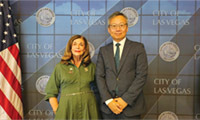▶ Roger Cohen
The honest answer is that we don’t know why a 20-something Briton with a degree in computer engineering or a young Frenchman from a Norman village reaches a psychological tipping point.
Zealotry of any kind subsumes the difficulty of individual choices into the exalted collective submission of dedication to a cause. Your mission is set. It is presented as a great one with great rewards. Goodbye, tough calls. Goodbye, loneliness.
Islamic State has been adept in exploiting the alienation felt by many young Muslims, from the “quartiers” of Paris to the back streets of Bradford. It offers to give meaning, whether in this life or the next, to meaningless lives.
The group has benefited from active support by online jihadi preachers and from tacit backing, or at least acquiescence, from imams in some mosques who are inclined, in the words of Prime Minister David Cameron of Britain, to “quietly condone.” It has manipulated anger over America’s wars in Iraq and Afghanistan, over Abu Ghraib and Guantánamo, over Shia ascendancy in the Middle East, over bleak existences on the margins of European society.
Still, the explanations fall short. Plenty of people experience great hardship or prejudice without opting to behead infidels and apostates, practice codified rape on teenage nonbelievers, and pursue the establishment of God’s rule on earth through his chosen caliph and in accordance with Shariah law.
Every effort of Western societies, particularly since 9/11, to curb the metastasizing jihadi ideology that threatens them has failed. Some of the organizations that grew out of that ideology have been hurt. But the ideas behind them, rooted in a violent rejection of modernity (but not all its tools, witness the Islamic State’s slick use of the Internet) and in an extreme, literalist interpretation of certain teachings of Sunni Islam, have proved of unquenchable appeal.
It’s a long way from Yorkshire to Raqqa in eastern Syria, yet some young British Muslims make the trip. Other recruits arrive from Saudi Arabia and Russia, Libya and Australia. The Islamic State has demonstrated very broad outreach. It is clearly tapping into something deep. Perhaps that something is at root a yearning to be released from the burden of freedom.
Western societies have been going ever further in freeing their citizens’ choices — in releasing them from ties of tradition or religion, in allowing people to marry whom they want and divorce as often as they want, have sex with whom they want, die when they want and generally do what they want. There are few, if any, moral boundaries left.
In this context, radical Islam offers salvation, or at least purpose, in the form of a life whose moral parameters are strictly set, whose daily habits are prescribed, whose satisfaction of everyday needs is assured and whose rejection of freedom is unequivocal. By taking away freedom, the Islamic State lifts a psychological weight on its young followers adrift on the margins of European society.
Mark Lilla, in an essay this year in The New York Review of Books on the French novelist Michel Houellebecq’s “Submission” (whose central character, a disaffected literature professor, ultimately chooses to convert to Islam) made this important point:
“The qualities that Houellebecq projects onto Islam are no different from those that the religious right ever since the French Revolution has attributed to premodern Christendom — strong families, moral education, social order, a sense of place, a meaningful death, and, above all, the will to persist as a culture. And he shows a real understanding of those — from the radical nativist on the far right to radical Islamists — who despise the present and dream of stepping back in history to recover what they imagine was lost.”
Lilla concluded that Houellebecq sees France in the grip of “a crisis that was set off two centuries ago when Europeans made a wager on history: that the more they extended human freedom, the happier they would be. For him, that wager has been lost. And so the continent is adrift and susceptible to a much older temptation, to submit to those claiming to speak for God.”
In Europe right now, those speaking most ardently for God tend to be Muslims. Some of them have spoken out bravely against the Islamic State. A majority see the movement as a betrayal of their religion. But the jihadi temptation to escape from freedom into all-answering zealotry is there and will not soon be curbed.
It is interesting that another foe of the West, President Vladimir Putin, attacks its culture from a similar standpoint: as irreligious, decadent and relativist, and intent on globalizing these “subversive” values, often under the cover of democracy promotion, freedom and human rights.
The great victory in 1989 was of freedom. But every triumph stirs a counterforce. The road to Raqqa is the road from freedom’s burden.
스마터리빙
more [ 건강]
[ 건강]이제 혈관 건강도 챙기자!
[현대해운]우리 눈에 보이지 않기 때문에 혈관 건강을 챙기는 것은 결코 쉽지 않은데요. 여러분은 혈관 건강을 유지하기 위해 어떤 노력을 하시나요?
 [ 건강]
[ 건강]내 몸이 건강해지는 과일궁합
 [ 라이프]
[ 라이프]벌레야 물럿거라! 천연 해충제 만들기
 [ 건강]
[ 건강]혈압 낮추는데 좋은 식품
[현대해운]혈관 건강은 주로 노화가 진행되면서 지켜야 할 문제라고 인식되어 왔습니다. 최근 생활 패턴과 식생활의 변화로 혈관의 노화 진행이 빨라지고
사람·사람들
more
[인터뷰] 멕시코 오지에 세운 ‘희망 진료소’… “관심과 행동이 등불”
멕시코 바하 캘리포니아의 작은 마을 ‘푼타 코로넷(Punta Colonet)’. LA에서 차로 7~8시간 정도 달려야 닿는 이곳에 한인 내과의…

김영완 총영사 LV 방문
김영완 LA 총영사는 지난 11일부터 13일까지 라스베가스(LV)를 방문, 시장 및 주지사실 산하 경제개발청, UNLV 호텔경영대학 등과 잇따…
어흥축제 국악경연대회 해외 참가자 특별 무대
2025 어흥축제가 우천으로 오는 12월12일로 연기된 가운데 이번 축제의 일환으로 예정됐던 미주 국악경연대회의 해외 참가팀 특별무대 행사가 …
[올림픽 골프] 3개 남가주 매장에서 ‘원스톱 골…
올림픽 골프가 추수감사절을 맞아 대규모 골프 용품 세일을 진행한다. 이번 세일은 골프 클럽, 골프백, 의류, 액세서리 등 다양한 골프 관련 제…
[한스전자] 인기 가전제품 최대 2,000달러 할…
한스전자가 연말을 맞아 삼성, LG, 딤채, 프리지데어 등 인기 가전제품을 대상으로 최대 2,000달러 대규모 할인 행사를 진행한다. 이번 행…
많이 본 기사
- 한인 대형교회 전도사 113만불 횡령… 8
- 사우디 빈살만 “1조달러 투자”…7년만의 방미환대 트럼프에 선물
- 2,000달러 관세 배당금… 내년에 … 1
- 아내 ‘냉동인간’ 만들더니 돌연 “혼자살기 적적해”…새 여친 맞은 남편 中서 논란
- 정용진, 빈살만 사우디 왕세자 美방문 환영행사 참석
- 관광비자 수수료 인상 185달러서 435달러로
- 트럼프, ‘7년만의 방미’ 사우디 빈살만에 오·만찬 ‘국빈급예우’
- 中, ‘日총리 발언 철회’ 요구에 日 거부… ‘주머니 손 中’ 영상도
- 한인 버스기사 살해범, 중범 불체자였… 1
- 조현병 나아졌다고 방치하면?… 5년 내 80% 재발 가능성 높아
- “첨단기술 노린 중국, 미국에 지난 24년간 2천억달러 대출”
- 한인타운 ‘우후죽순’ 노점상들 버몬트… 1
- 도요타, 미국 내 하이브리드車 생산 확대… “9억 달러 규모 투자”
- 대형유통점 홈디포 연간 실적전망 하향… “소비 경고음”
- 최현우, ‘13억’ 로또 1등 예언 적중에 고소당할 뻔..”당첨금 수령은 노코멘트”[돌싱포맨]
- 셧다운 기간인 10월 중순에도 실업지표 안정적
- 구글 피차이 “AI 버블 터지면 면역있을 회사 없어”
- 강경화 주미대사 “美와 긴밀소통해 韓… 1
- ‘강제추행 혐의’ 오영수, 대법원 간다..검찰 ‘무죄 판결’에 상고
- 클라우드플레어 장애…챗GPT·X 등 다수 한때 접속 안돼
- 구글, 차세대 AI ‘제미나이3’ 출시…검색창 전진배치해 정면승부
- 론스타와 ‘13년 국제소송전’ 마침표… ‘배상금 0원’ 완승
- ‘한채영 닮은꼴’ 28기 영숙 “반복되는 오해” 성형 시술 입 열었다
- ‘쯔양 협박’ 구제역, 수감 중 방송 은퇴 “피해자들에 죄송”
- 서예지, 가스라이팅→학폭 논란 후 복귀 준비 중..머리 산발에도 미소
- 오늘도 해결사! 이강인 환상 크로스→이태석 A매치 데뷔골 쾅! 한국, 가나에 1-0 신승 ‘포트2 보인다’
- 회장선거(뉴저지한인회) 놓고 내분사태… 1
- ‘수술→FA→48G 출전→또 FA’ 김하성, “1년 계약 가능성 높아” 새로운 시나리오 나왔다
- 김건희특검, 내일 ‘마지막 수사기간 연장’ 신청…내달 28일까지
- 애쉬번서 충전중인 배터리서 불…120만불 피해
- VA 페어팩스서 신종 ATM 절도범 설쳐
- ‘사의표명’ 정진우 중앙지검장 “논란 속에 직 내려놔 마음아파”
- 韓 대통령실 “UAE 150억불 방산… 1
- 우편요금 또 오른다 내년초 최고 7.… 1
- 오바마케어 대체 ‘트럼프케어’ 나오나
- 장학생 20명 선정…장학금 총 3만불
- “워싱턴교협 50년, 다음세대에 방향 제시하는 좌표”
- 갑상선암, 운동과 상관없다더니…10년만에 결과 뒤집혀
- 사자와 생쥐, 그리고 인간 이야기
- “75년 세대 잇는 이화의 대화합”
- ‘엡스타인 논란’에 입장 돌변 트럼프 “문건 전부 공개하자”
- OC 유일 대학 병원 ‘UCI 헬스’ 최고 수준 서비스
- H 마트, 2026년 탁상용 달력 무료 증정
- 사우디 빈살만 “1조달러 투자”…7년만의 방미환대 트럼프에 선물
- ‘네이버 플러스’호스피스 자원봉사자 31명 배출
- [LA 지역 샤핑 명소 10] 럭서리… 1
- 주택 가스누출 ‘폭발’ 치노힐스서 8명 부상
- LA 일대 나흘간 폭우 11월 최대 강수량 기록
- 대한은 다시 살아나는가
- LAX, 최대 공항 3위… 혼잡도 최악
1/5지식톡

-
 테슬라 자동차 시트커버 장착
0
테슬라 자동차 시트커버 장착
0테슬라 시트커버, 사놓고 아직 못 씌우셨죠?장착이 생각보다 쉽지 않습니다.20년 경력 전문가에게 맡기세요 — 깔끔하고 딱 맞게 장착해드립니다!장착비용:앞좌석: $40뒷좌석: $60앞·뒷좌석 …
-
 식당용 부탄가스
0
식당용 부탄가스
0식당용 부탄가스 홀세일 합니다 로스앤젤레스 다운타운 픽업 가능 안녕 하세요?강아지 & 고양이 모든 애완동물 / 반려동물 식품 & 모든 애완동물/반려동물 관련 제품들 전문적으로 홀세일/취급하는 회사 입니다 100% …
-
 ACSL 국제 컴퓨터 과학 대회, …
0
ACSL 국제 컴퓨터 과학 대회, …
0웹사이트 : www.eduspot.co.kr 카카오톡 상담하기 : https://pf.kakao.com/_BEQWxb블로그 : https://blog.naver.com/eduspotmain안녕하세요, 에듀스팟입니다…
-
 바디프렌드 안마의자 창고 리퍼브 세…
0
바디프렌드 안마의자 창고 리퍼브 세…
0거의 새제품급 리퍼브 안마의자 대방출 한다고 합니다!8월 23일(토)…24일(일) 단 이틀!특가 판매가Famille: $500 ~ $1,000Falcon: $1,500 ~ $2,500픽업 & 배송직접 픽업 가능LA…
-
 바디프렌드 안마의자 창고 리퍼브 세…
0
바디프렌드 안마의자 창고 리퍼브 세…
0거의 새제품급 리퍼브 안마의자 대방출 한다고 합니다!8월 23일(토)…24일(일) 단 이틀!특가 판매가Famille: $500 ~ $1,000Falcon: $1,500 ~ $2,500픽업 & 배송직접 픽업 가능LA…
케이타운 1번가
오피니언
 노세희 부국장대우·사회부장
노세희 부국장대우·사회부장 대한은 다시 살아나는가
 민경훈 논설위원
민경훈 논설위원사자와 생쥐, 그리고 인간 이야기
 한형석 사회부 부장대우
한형석 사회부 부장대우 한인타운 교통 인프라 개선 기대
 박영실 시인·수필가
박영실 시인·수필가 [화요칼럼] 말의 위력
 양홍주 / 한국일보 논설위원
양홍주 / 한국일보 논설위원 [지평선] 외국어 공부와 장수
 이상국
이상국 ‘도반(道伴)’
 옥세철 논설위원
옥세철 논설위원러시아제국 부활의 꿈은 멀어져만 가고…

폭발 직전의 상황인가?
 메건 매카들 워싱턴포스트 칼럼니스트 / CNN ‘GPS’ 호스트
메건 매카들 워싱턴포스트 칼럼니스트 / CNN ‘GPS’ 호스트 [메건 매카들 칼럼] 지나간 시대의 낙관주의
1/3지사별 뉴스

‘네이버 플러스’호스피스 자원봉사자 31명 배출
뉴저지 팰리세이즈팍에 위치한 비영리단체‘네이버 플러스’(Neighbor Plus·이사장 양춘길 목사)가 말기암 환자와 그 가족들을 돌보는 제4…
회장선거(뉴저지한인회) 놓고 내분사태 ‘악화일로’

“워싱턴교협 50년, 다음세대에 방향 제시하는 좌표”
“구슬이 서 말이라도 꿰어야 보배라는 말이 있다. 구슬을 꿰어 보배를 만들어 낸 편찬위원회에 감사하고, 지난 50년간 그 구슬을 만들어낸 여러…
장학생 20명 선정…장학금 총 3만불

사우디 빈살만 “1조달러 투자”…7년만의 방미환대 트럼프에 선물
사우디아라비아가 18일 대미 투자액을 기존에 발표했던 6천억 달러(약 876조원)에서 1조 달러(약 1천460조원) 규모로 상향 조정하기로 했…
방한후 美입국했다 석연찮게 구금된 한인과학자, 4개월만에 석방

오늘 하루 이 창 열지 않음 닫기 

















































.png)


댓글 안에 당신의 성숙함도 담아 주세요.
'오늘의 한마디'는 기사에 대하여 자신의 생각을 말하고 남의 생각을 들으며 서로 다양한 의견을 나누는 공간입니다. 그러나 간혹 불건전한 내용을 올리시는 분들이 계셔서 건전한 인터넷문화 정착을 위해 아래와 같은 운영원칙을 적용합니다.
자체 모니터링을 통해 아래에 해당하는 내용이 포함된 댓글이 발견되면 예고없이 삭제 조치를 하겠습니다.
불건전한 댓글을 올리거나, 이름에 비속어 및 상대방의 불쾌감을 주는 단어를 사용, 유명인 또는 특정 일반인을 사칭하는 경우 이용에 대한 차단 제재를 받을 수 있습니다. 차단될 경우, 일주일간 댓글을 달수 없게 됩니다.
명예훼손, 개인정보 유출, 욕설 등 법률에 위반되는 댓글은 관계 법령에 의거 민형사상 처벌을 받을 수 있으니 이용에 주의를 부탁드립니다.
Close
x